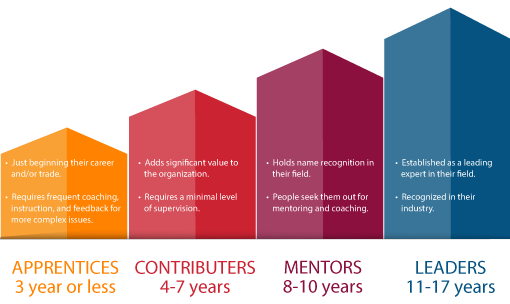
Becoming an expert in any given field takes commitment, determination and more importantly — time. Research shows that it will take the average person between ten and seventeen years of dedication, practice and experience to become considered an expert in one’s field. Very few professional accomplishments happen overnight. A person cannot simply step into a profession and immediately be considered an expert.
Career management expert Caela Farren
(author of Who’s Running Your Career?) describes the steps toward mastery and
what employees should be capable of accomplishing at each level and what is
needed to help them master the expertise of their profession:

Apprentice — An
apprentice is someone who is just starting his or her career or learning a
trade. The apprentice requires a great deal of time and dedication to
building his or her knowledge base and will benefit from frequent coaching and
feedback on complex tasks and projects. The supervisor can provide
guidance until enough experience and knowledge has been passed along thus
allowing the apprentice to advance to the next skill level.
Contributor — Contributors
are capable of tackling sophisticated issues within their field and can offer
the appropriate solutions to complex problems and should be determining what
skills or competencies are necessary to progress in their organization. They
should also be taking on stretch assignments outside their comfort zone such as
participating in higher level projects that will give them an opportunity to
showcase a skill or ability.
Mentor — Mentors
are relied upon to set the example and guide contributors and apprentices
within the organization. They are sought
after by all within the organization to solve complex problems beyond the
limited capability of the contributors or apprentices. They also can provide new insight and
knowledge for the less experienced professional.
Leader — Leaders
are completely self-sufficient and are the driving force of innovation and the
development of the next generation of leaders. They are known organizationally and industry wide for their expertise,
character and competence. They are
strategic thinkers and have a clear vision and specific plans for carrying out
the organization’s mission.
Understanding
the degrees of development for each step toward mastery (set forth above) is
critical to building the next generation of leaders. While experience and time are vital, how you
use that time and impart that experience will make the difference and maybe
even accelerate the process!
ASK A MENTOR
Oftentimes,
your goal as mentoree is to become a master within a field, industry or
organization that you care about. Understanding the degrees of development for each stage of your career
will help you to shape your mentoring plans and activities. . Depending on which
stage you are at in your career, consider the following questions to ask your
mentor at your next mentoring meeting:
Apprentice
Contributor
Mentor
Leader